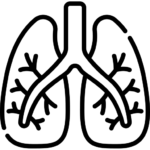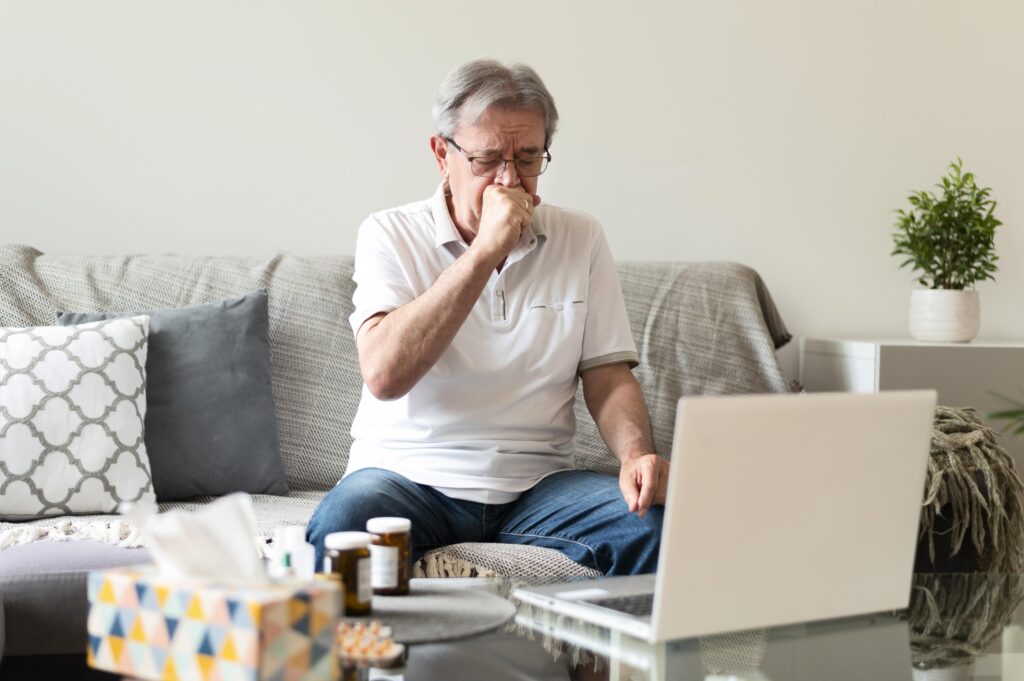Coping with lung cancer
When other people's actions have an impact on me, it's never fair.
I don't choose lung cancer
One of the most common things you’ll hear from kids if you hang around with them long enough is, “That’s not fair!” My son Nathan used this statement countless times during his difficult developmental years. However, if we’re being sincere, it’s not only kids who demand fairness. It’s human nature for all of us to want fairness, which may make lung cancer diagnosis particularly challenging.
You might think it’s unfair that you or someone you care about should have to deal with lung cancer, especially if you’re too young if you’ve taken good care of your body, if you’ve rarely been sick, if you’ve dealt with cancer before in another family member, or if you’ve got a lot on your plate already. Unfortunately, lung cancer patients had the greatest rate of experiencing “not fair” feelings among those with cancer diagnoses. It’s human nature to feel better when we can pin the blame on someone else. This is certainly the case regarding lung cancer, often associated with cigarette/cigar smoking or exposure to chemicals like asbestos/radon at home or work. All these elements profoundly influence the patient’s reaction to a lung cancer diagnosis. It’s not right that other people’s actions have caused me pain “from a lung cancer patient’s point of view”.
Lung cancer is often assumed to be caused by smoking. The truth is that one out of five women who develop lung cancer has never smoked. Among those women with a smoking history, many quit smoking ten years or more before developing lung cancer.
( Yolonda Colson, MD, PhD )
( Director, Women’s Lung Cancer Program )

Lung Cancer Coping with lung cancer
Your concerns and feelings about “not being treated fairly” are reasonable. Those who have received a lung cancer diagnosis may feel as if their world has been flipped upside down, not only at the moment of diagnosis. Permit yourself to mourn the loss of your idealized future self or the life you thought you would have. Embrace the reality of the situation and figure out ways to get through it and flourish in it. Just like anyone else who has been chronically ill or through treatment knows, keeping up with the expectations of caretaking may seem like a full-time job in and of itself. Some strategies for coping with lung cancer are outlined below:
- Understanding lung cancer and what is within your control
- Coping emotionally and acknowledging emotional self-care
- Coping with physical side-effects
- Coping with social

Coping with lung cancer Understanding lung cancer and what is within your control
Brief overview
Cancer that starts in the lungs is called lung cancer. The lungs are a pair of sponge-like organs in your chest responsible for oxygen intake and carbon dioxide exhalation. Lung cancer is the leading cause of cancer mortality globally. Lung cancer is more common among smokers but may also develop in nonsmokers. Long-term cigarette smoking raises the risk of lung cancer. However, even if you have smoked for many years, you may significantly lower your risk of lung cancer if you stop.
Types of lung cancer
Lung cancer comes in a few distinct varieties, the most common two of which are:
- Non-small cell lung cancer (NSCLC) The most common type of lung cancer with three subtypes
- Adenocarcinoma – develops from a particular type of cell that produces mucus (phlegm) and is often found in the periphery of the lungs.
- Squamous cell cancer – often found near the central part of the lung along the major airways (left or right bronchus).
- Large-cell carcinoma – large cells and polygonal in shape under microscopy that are largely located at the periphery of the lung. They tend to grow rapidly and spread more aggressively compared to other lung cancers.
- Small cell lung cancer (SCLC) SCLC comprises around 15% of lung cancers and is strongly linked with cigarette smoking and it tends to start in the middle of the lungs.

Signs & symptoms of lung cancer
- Persistent cough
- Chest pain
- Hoarseness
- Weight loss
- Recurrent lung infections
- Bone pain
- Shortness of breath
- Fatigue
- Wheezing
- Coughing up blood
- People above 40
- Smokes and second-hand smokers
- Exposure to cancer-causing chemicals such as asbestos, silica, and diesel exhaust
- Exposure to air pollution
- Exposure to radon gas
- Previous lung disease, including chronic obstructive pulmonary disease (COPD) or lung infection
- Family history of lung cancer
Dealing with treatments and health provider
Knowing your specific form of cancer and its treatment options may help you better manage your symptoms and make essential choices. Preparing for anything helps to have some idea of what could happen.
Learning new information may be challenging for anyone, but it’s more challenging after receiving a diagnosis. Get your questions ready for the doctor by writing them down. Bring along a friend who can help you remember your queries. In addition, they may assist you in recalling the information presented. It can be hard to handle a lot of new information. If you have any questions after hearing from your physicians and nurses, feel free to ask them again. Keep in mind that you don’t have to solve every problem immediately. Solving each problem might take a while. If you need assistance, don’t be afraid to ask for it.
It's never easy to stop, so why not try cutting down then?
( Joseph L. Wong )

Coping with lung cancer Coping emotionally and acknowledging emotional self-care
When you get the news that you have cancer, your emotions may go through a wide range of swings. The truth may shock and disturb you. You may also experience the following:
- Overwhelmed
- Anger & resentment
- Fear & worry
- Positive & negative hope
- Grief, guilt, loneliness, numb, and confused
Any or all of these feelings might apply to you. Or you might have an entirely different reaction. Every person responds uniquely. For example, it might be challenging to accept the diagnosis when dealing with cancer. It’s normal to go through a range of emotions as you adjust to life with cancer. A wide range of emotions is normal and expected.
Determining which emotion is having the most impact on you
It might seem like a double-whammy when the physical state influences one’s emotional energy. But, in addition to getting help from friends and family and maybe a counselor, the best way to keep your energy up is to pay attention to your basic needs and emotion acknowledgements. It is not easy to distinguish which emotion comes first but prioritizing which affects you the most could make it easier for you to deal with this challenge more positively and effectively. One of the easiest ways to manage emotions is to explain what feelings you are currently struggling with or speak with a mental health practitioner to help you determine and overcome your current state.
Get your thoughts down on paper
You may draft a message to whomever you’ve wished to share your feelings with, including your future self, previous self, or even the person you are right now. This message can be a private thing, or it can be shown to anyone. While writing it, you may even tear it up and toss it into the air to get rid of it. When we put our ideas into paper, it may seem like a weight has been lifted.
Cognitive distortion and misbelieve due to emotions
- Having cancer that can only exist in two ways
Having an extreme perspective on things (e.g., I’m either going to be cured or I’m going to die.) You may experience less fear and frustration if you reduce this line of thought. Instead of making a hasty “life or death” decision, you should take the time to learn about your treatment options and talk to your doctor about the pros and cons of each. - Overgeneralization
judging your whole life or character based on one bad thing (e.g., “Because of my illness, I made my wife worry and struggle so much to make ends meet, I’m a useless husband”). - Putting the negative ahead of the good
Even though there is evidence that something good happened (“My test results show that the treatment is working, but I think cancer will probably come back due to some studies I read.”) - Jumping to conclusions on others
Making assumptions about the ideas and motives of other people (“My BFF hasn’t phoned to check on me recently, means she doesn’t care”) - Statements containing the word “should.”
Placing unreasonable expectations on oneself or others and expecting them to act on them (e.g., “I should not burden my friends and family or seek support, no matter what. - Internalizing
A mental state in which one assumes total responsibility for an external event “I probably wouldn’t have developed cancer if my life wasn’t so stressful. It is definitely my fault since I don’t smoke nor have friends who smoke, and my working/housing area is safe.”
Do what makes you happy
You should get back into your activities, even if you have to make some changes. Think about what you did to get through hard times in the past. If you want to watch a children’s movie that made you happy when you were young or that your children or grandchildren like now, go ahead. It would help if you filled your life with things and people who make you happy and actively sought out situations that fill you with wonder. You might also try taking up an activity like drawing, meditating, reading, deep breathing, crafting, learning an instrument, or learning a new skill. Distract the emotional side of your brain with some handwork.
Lung cancer is an experience that may be dealt with in various ways. Remember that you are the foremost authority in your life, and treat yourself with kindness and patience.


Coping with lung cancer Coping with physical side-effects
Changes to your body’s physical attributes are possible as a result of having lung cancer and undergoing treatment for it. The way you think and feel about yourself may change as a result of these. There is a possibility that you may have symptoms such as a cough or difficulty breathing. Experiencing this may cause distress and anxiety.
Speak to your physician
Have frequent conversations with the associates of your healthcare provider about how you are feeling. It is crucial to keep them informed about any new side effects or changes in those that have already been identified. If they are aware of how you are feeling, they will be able to identify ways to alleviate or control your side effects, which will make you feel more comfortable and may prevent any side effects from occurring in the first place.
Be aware of the side effects
Sometimes, once treatment is over, the side effects might prolong. These are what doctors refer to as long-term side effects. Late effects are side effects that appear months or years after treatment. As part of this treatment, survivors need to address their long-term side effects and late consequences. Speaking from my experience, in addition to three battles with cancer, I’ve experienced two episodes of heart and lung failure, which caused a massive intake of steroids in my body, resulting in six shattered bones five years later. If I had known about the long-term adverse effects of the drugs, I might have been ready for it today “Joseph l. Wong”.
Some other physical problems
Changes such as weight loss and hair loss might influence your self-esteem and the way you react to other people. Your dietitian can assist you with any weight loss difficulties, and your physician can help you find ways to cope with hair loss.
Tiredness and feeling tired a lot of the time are typical throughout treatment and for several months afterwards. Resting but also undertaking some modest physical exercise may be beneficial.
Surgery might create scars, or you can experience discomfort following your procedure. Talk to your doctor or nurse if the pain is a concern. There are dozens of things they can do to help. These include altering your pain meds or assisting you with relaxation exercises.


Coping with lung cancer Coping with social
You may get emotional and practical support from telling your loved ones about your cancer diagnosis. However, some individuals won’t want to communicate because they fear the feelings it may trigger. They may be concerned that you won’t be able to handle your position, or they may be frightened that they will say something inappropriate. It might strain your relationships if you and your loved ones aren’t communicating. However, communication may help build trust and solidarity.
Let your loved ones know if you want to chat with someone about how you’re feeling. If you wish to speak to someone and do not want to burden your friends and family members, you could reach out to a counsellor or a peer support group who are struggling with the same issue. They can find you the necessary assistance. They are also able to provide you with information.
Humans need to express our psychological suffering to individuals we trust. It contributes to the feeling that we are linked to the world. It can become all-consuming if there is no outlet for it, which makes everything more complicated. If you start to feel that your mental health is getting out of control, another choice would be to see your family doctor or a psychiatrist to find out what kinds of medications are at your disposal. There is no need to feel embarrassed about seeking help. When it comes to taking care of ourselves, many people believe this is one of the essential things we can do.
What you can do
- Talk to those close to you about how you feel.
- You may find others who understand what you’re going through by joining organizations, associations, or any government community support groups.
- Find a counselor who has worked with clients who have terminal illnesses.

Coping with lung cancer Summary
- In conclusion, while lung cancer may be devastating, it is typically curable if detected and treated early.
- Regular screenings may be a good idea for those at high risk of lung cancer. It may contribute to the early detection of cancer, allowing treatment to begin before the disease can spread.
- A doctor should be consulted by anyone worried about developing lung cancer.
- If you’re feeling emotionally down, you must talk to someone close to you.
- Talk to a professional counsellor if you feel like losing control of your emotions.
- Participate in a support group and learn from the experiences of other people who have overcome adversity.

Scanxiety – Phases, Symptoms, and Coping with it

Reaching new levels of relaxation using guided imagery – for stress and anxiety

The Emotion Wheel: Everything to know

Coping with lung cancer

Deeper insight into what cancer patients feel
